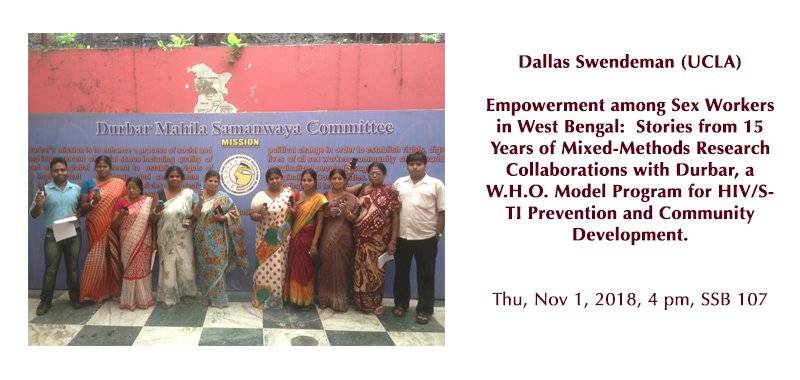Nov 1, 2018–Nov 1, 2018 from 4:00pm–5:30pm
Dallas Swendeman (UCLA), Empowerment among Sex Workers in West Bengal

In 1991, the W.H.O. funded a rapid appraisal and HIV prevention program in the Sonagachi red light area of Kolkata. In 1995, a process of community leadership and ownership was initiated with the establishment of the Durbar Mahila Samanwaya Committee (transl. Unstoppable Equal Women’s Committee) and its’ USHA Multi-Purpose Banking Cooperative (now the largest micro-banking cooperative in South Asia). This enabled “Durbar” to evolve into a “community-led structural intervention” that responds to priorities of sex workers and their families, such as economic security, education, human and workers’ rights, stigma and discrimination, police other power-broker abuses, and human trafficking, in conjunction with HIV/STI prevention efforts. Durbar has scaled up to over 60,000 sex workers and their families at 60+ sites in West Bengal and served as a model for the Bill and Melinda Gates Foundation funded scale-up of HIV prevention in India, Project Avahan. This talk will highlight Durbar’s evolution, components and underlying functioning, and successes and challenges from over 15 years of mixed-methods research and training collaborations. Dallas Swendeman, Ph.D., M.P.H, is a multi-disciplinary behavioral and prevention scientist with training in psychological and medical anthropology, sociology and organizational studies, and public health program planning, research, and evaluation. He has worked for 25 years in HIV prevention in the U.S. and India, with a longstanding interest in empowerment and community mobilization, and more recent focus on mobile and social media technologies for research and intervention applications.
Date and Time
Nov 1, 2018–Nov 1, 2018
from 4:00pm–5:30pm
Location
Event Registration
Registration is not required for this event.
Event Fee
Free
Contact
South Asia Initiative at UC San Diego • southasiaucsd@gmail.com
Audience
Faculty, Staff, Students, The General Public
Event Host
South Asia Initiative at UC San Diego, Dept of Anthropology, Global Health Program (GHP) & Center on Gender Equity & Health (GEH)/School of Medicine.